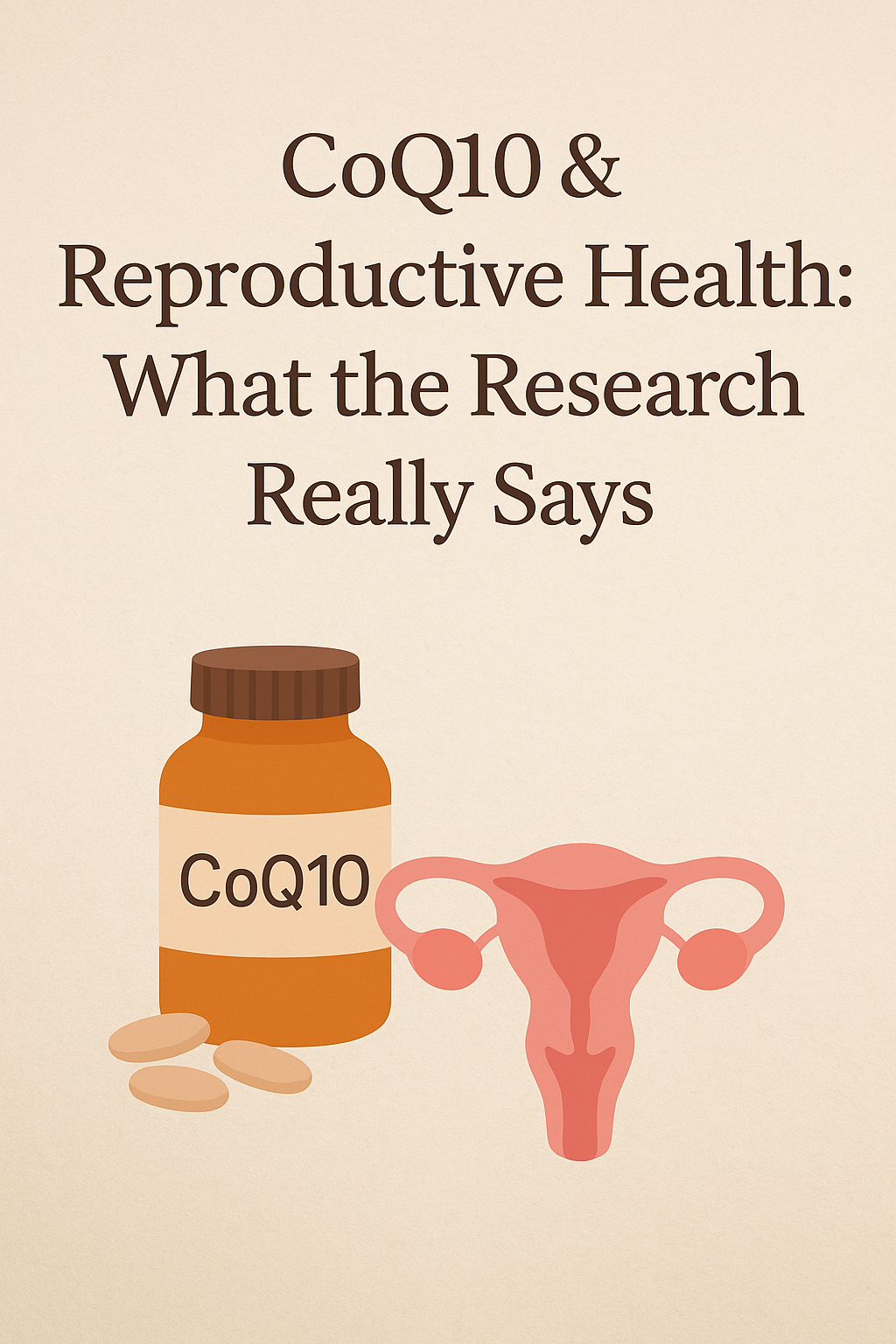Introduction: Why CoQ10 is Relevant to Reproductive Health
CoQ10 is a fat-soluble molecule found in the mitochondrial inner membrane, critical for ATP production and antioxidant defence. Its levels decline with age and certain exposures — a pattern that overlaps with known declines in fertility. Animal and human studies suggest CoQ10 may support both female and male reproductive function by improving mitochondrial energy, reducing oxidative stress, and enhancing cellular health.
The Science Behind CoQ10 & Reproduction
→ Mechanisms of Action
-
Mitochondrial bioenergetics: Oocytes and sperm have high energy demands; CoQ10 supports electron transport and ATP generation.
-
Antioxidant protection: Oxidative stress damages gametes (oocytes, sperm); CoQ10 helps scavenge reactive oxygen species (ROS) and protect DNA/mitochondria.
-
Hormonal/ovarian function support: Some data suggest improved ovarian response, better embryo quality and improved sperm parameters with CoQ10 use.
→ Evidence in Female Reproductive Health
-
A 2016 RCT showed that pre-treatment with CoQ10 improved ovarian response and embryo quality in young women with poor ovarian reserve undergoing IVF-ICSI: researchers found more retrieved oocytes, higher fertilisation rate and more high-quality embryos.
-
A 2020 meta-analysis found that CoQ10 supplementation in women undergoing ART increased the clinical pregnancy rate (OR 2.44) but did not significantly improve live birth rate or reduce miscarriage rate.
-
A 2021 review concluded that CoQ10 supplementation “may improve human oocyte quality and subsequent reproductive performance, although the available data do not clearly prove its ability” to do so.
Key takeaway (female side): promising but not definitively proven. Good embryo quality, improved ovarian response: yes. Live birth benefit: less clear.
→ Evidence in Male Reproductive Health
-
A systematic review found that CoQ10 supplementation improved semen parameters (sperm count, motility, morphology) in men with idiopathic infertility — though optimal dose and long-term effects remain unclear.
-
A recent 2025 study on idiopathic oligoasthenospermia (OA) found that 300 mg/day CoQ10 for 3 months improved progressive motility, total motility, antioxidant capacity in seminal fluid and reduced ROS.
Key takeaway (male side): stronger signal of benefit for sperm health, especially in oxidative stress contexts. Less robust data on pregnancy/live-birth outcomes.
Practical Considerations: What This Means
-
CoQ10 may be adjunctive in a fertility support plan — not a standalone magic bullet.
-
Timing matters: Because mitochondrial and oxidative damage accumulate over time, initiating CoQ10 pre-conception (and ideally ~ 3 months ahead of IVF/ART) may make sense.
-
Dosage: Clinical protocols vary (e.g., 100-600 mg/day in studies). No standard fertility dose yet.
-
Combination approach: CoQ10 works best alongside lifestyle interventions — optimal nutrition, good sleep, stress reduction, and avoidance of toxins.
-
Safety & interactions: Generally well tolerated, but always check for contraindications (e.g., interactions with anticoagulants).
-
Patient expectation: Important to communicate realistic results — improved egg or sperm quality is one component of fertility, not the only one.
How CoQ10 be incorporated into Pre-Pregnancy/Fertility Protocols
-
Assess baseline: Age, ovarian reserve (AMH/AFC), sperm parameters, history of ART failures.
-
CoQ10 can help if there’s evidence of diminished reserve, advanced maternal age (>35), oxidative stress indicators, or male factor with motility issues.
-
Have to pair with core fertility nutrients: folic acid, vitamin D, omega-3s, antioxidants (vitamins C/E), lifestyle optimisation.
-
Outcomes need to be monitored: for women — number of retrieved oocytes, embryo quality; for men — sperm motility, morphology, ROS markers if available.
-
Reassessment after ~3-6 months and correlation with clinical outcomes (pregnancy, live birth where applicable).
Contraindications and Precautions
While CoQ10 is generally safe and well-tolerated, certain individuals should exercise caution or avoid supplementation unless medically advised. Always discuss with a healthcare provider before starting CoQ10 — especially in fertility treatment contexts.
⚠️ 1. People on Blood Thinners or Anticoagulants
-
CoQ10 is structurally similar to vitamin K and may reduce the effectiveness of warfarin (Coumadin) and other anticoagulants.
-
This could increase the risk of clot formation or interfere with INR control.
👉 Consult your physician if you’re on warfarin, heparin, or similar agents.
⚠️ 2. Individuals on Blood Pressure or Diabetes Medications
-
CoQ10 can slightly lower blood pressure and blood sugar.
-
Combining it with antihypertensive or hypoglycaemic agents may cause additive effects, leading to hypotension or hypoglycaemia.
👉 Monitor levels closely if you’re on medications for hypertension or diabetes.
⚠️ 3. Pregnant or Breastfeeding Women
-
Though naturally present in the body, safety data for supplemental CoQ10 during pregnancy and lactation are limited.
-
Supplement only under direct medical supervision if planning or undergoing fertility treatment.
⚠️ 4. People Undergoing Surgery
-
Because CoQ10 can influence platelet activity and interact with anaesthetic drugs, it is advisable to stop supplementation at least two weeks before elective surgery.
⚠️ 5. Known Allergies or Sensitivities
-
CoQ10 supplements may contain soy, gelatin, or other excipients that cause allergic reactions in sensitive individuals.
-
Always read labels carefully.
Limitations & Research Gaps
-
Many studies are small, heterogeneous in dose/timing/population.
-
Live birth data for women remains limited.
-
Long-term safety in fertility context not fully established.
-
Optimal dose, form (ubiquinol vs ubiquinone), duration and patient selection criteria still evolving.
-
Not a substitute for underlying fertility investigation (anatomical, endocrine, genetic causes).
Summary
In summary: CoQ10 shows solid mechanistic plausibility and promising data — especially for improving gamete quality through mitochondrial and antioxidant pathways. For women with diminished ovarian reserve or undergoing ART, and men with motility/oxidative stress issues, CoQ10 is a valuable addition. But it is not a guarantee of pregnancy or live birth. Integration into a broader fertility-optimisation plan is essential.
References
-
Pretreatment with CoQ10 improves ovarian response and embryo quality in young women with poor ovarian reserve. – PMCID PMC5870379.
-
Does Coenzyme Q10 supplementation improve fertility outcomes in women with infertility undergoing ART? – PMC7550497.
-
Beneficial antioxidant effects of Coenzyme Q10 on reproduction. – PMID 36707133.
-
The effect of CoQ10 supplementation on ART treatment and oocyte outcomes. – PMID 37102567.
-
Coenzyme Q10 and oxidative stress in male infertility: a review. – PMID 34078005.
CoQ10 reproductive health, CoQ10 fertility, CoQ10 egg quality, CoQ10 sperm motility

Akanksha Sharma
Dr. Akanksha Sharma, Head Writer and creator of AtoZ of Pregnancy, is dedicated to empowering women, parents, and families through 360-degree knowledge. She and her team provide evidence-based advice to guide families through pregnancy, parenting and beyond.







Leave a Reply